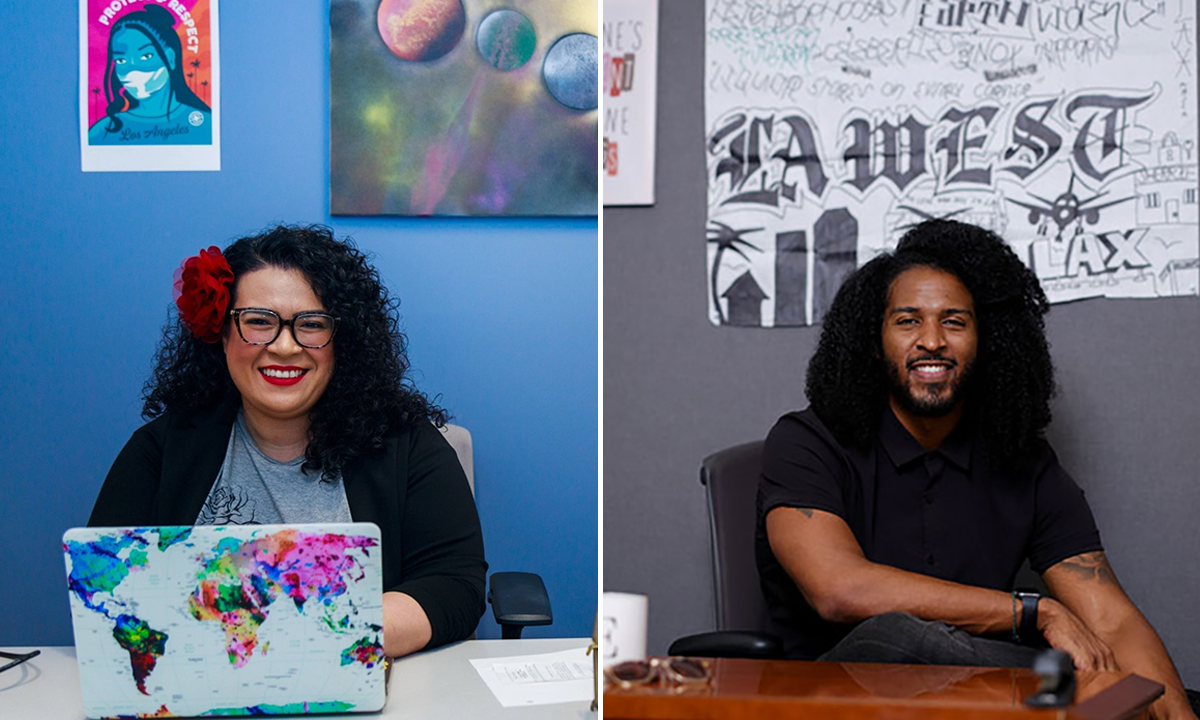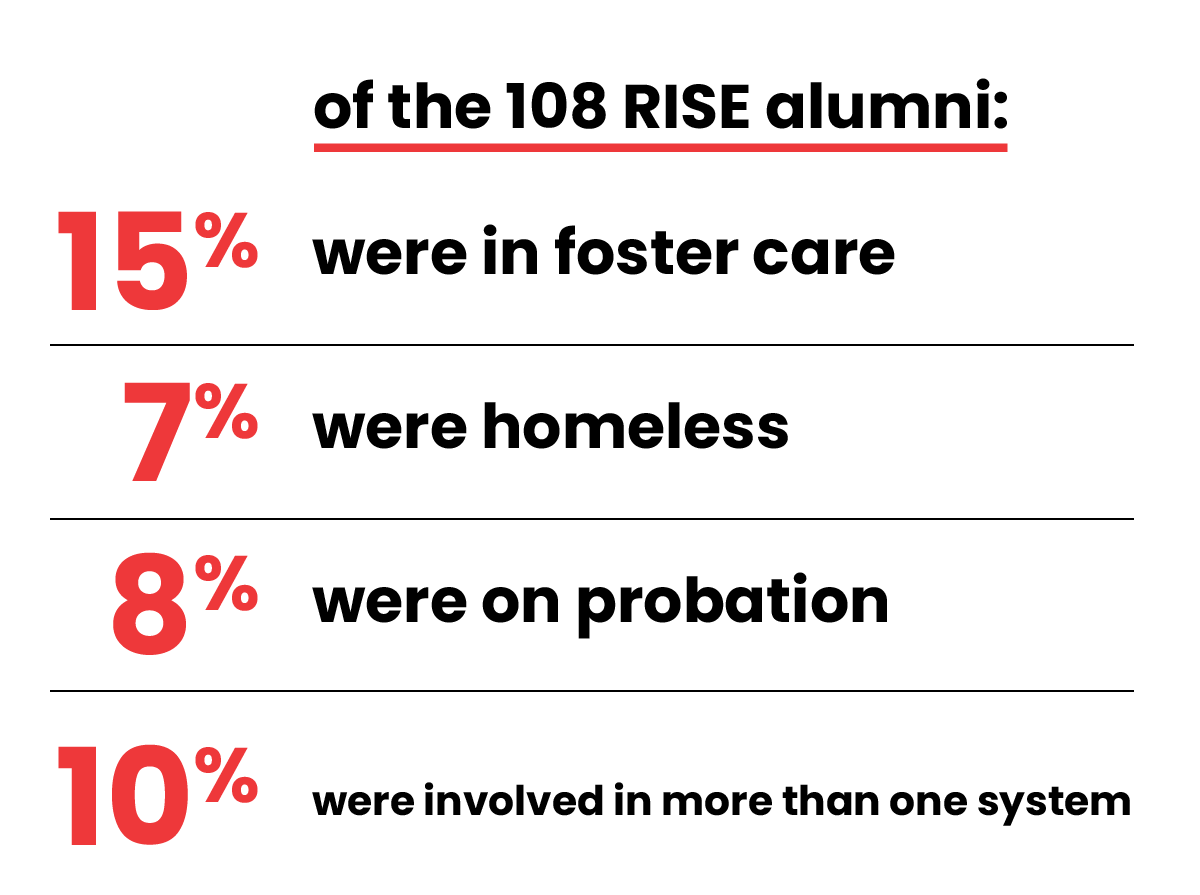30% of Our Alumni Experienced Housing Instability — How They Succeeded Here
How Los Angeles’s Da Vinci RISE High School created a high school that offers stability for young people in unstable environments.

Get stories like this delivered straight to your inbox. Sign up for The 74 Newsletter
This article has been produced in partnership between The 74 and the XQ Institute.
It was 2018, and 17-year-old Daniella was one of our students at Da Vinci RISE High School. She was an artist interested in graphic design and braiding hair.
But as a young person in Los Angeles’s foster care system, she spent less time thinking about her passions and more time worrying about her day-to-day survival because her 18th birthday was approaching. On that date, she’d age out of the foster care system overnight, lose access to youth housing resources and be on her own financially. On top of that, Daniella, whose name has been changed in this piece to protect her privacy, was pregnant.
She was increasingly focused on questions like, “How do I find housing?” “How do I prepare for motherhood?” “How will I afford to live?”
In Los Angeles County alone, there are more than 51,000 homeless students. Another 7,000 of the county’s children are in foster care. The vast majority of these young people, like Daniella, face challenges that would disrupt the lives of even the most well-resourced adults. The result is that many attend school intermittently, if at all, and are invisible to the traditional school system, which rarely meets their complex needs.
We created Da Vinci RISE High School to serve Daniella and many others like her in our community. We’re able to do so because we designed a school that bucks the traditional model, with more flexible, personalized learning and supports tailored for each individual student’s needs.

For Daniella, we helped tailor her education to address her changing life circumstances: as a part of her project, she created a personalized budget, applied for jobs, explored mothering classes, investigated the process to access housing, and what it means for foster youth, all while still demonstrating her individual subject mastery on nationally recognized growth assessments. We use these assessments to inform our teaching and to help young people who feel beaten down by standardized tests get a more nuanced view of where they are making progress.
Listening to students is just one way to rethink high school. For more, check out The XQ Xtra, a newsletter for educators that comes out twice a month. Sign up here.
We, as principal and executive director of RISE, both know this student population well. We are born and raised Angelenos, and while we started our teaching journeys on opposite sides of the country — Naomi at an independent study charter school in L.A. and Erin as a Teach For America instructor in Miami — we’ve both spent our careers witnessing firsthand the stabilizing and healing power of flexible, personalized education for students whose lives are complicated and unstable outside of the classroom. Our shared belief that each student’s unique journey is worth embracing is what drives Da Vinci RISE, which opened in 2017 with support from the nonprofit XQ Institute.
No two RISE students are exactly alike, but almost all of the 200 young people we serve each year have been failed by the traditional school system. Of the 108 RISE alumni to date, 15% were in foster care, 7% were homeless, 8% were on probation, and 10% were involved in more than one system. These are students who may be older than the typical high school student, they might be on probation, they might be young parents and/or they may have full-time jobs, all of which can get in the way of school being their number one priority. Compared with other students across the L.A. school district, RISE students are twice as likely to have diagnosed disabilities, three times as likely to be experiencing homelessness, and 20 times as likely to be in the foster care system.

Just like any other young person, our students want to be successful. They have passions, big dreams and goals; they just haven’t had access to the resources to achieve them. At RISE, we know our students are resilient and have had to be more strategic and agile than even many of the most successful adults. We work to access their hearts and minds, learn each student’s individual needs and circumstances and then build the education around them.
In the traditional, one-size-fits-all school system, the challenges outside the classroom for a student like Daniella are beyond any school’s scope of responsibilities and resources. But at RISE, Daniella knew a team of people were there to help meet her needs. She trusted us enough to ask for that help. And we responded by asking ourselves: how can we design an educational track to help her build the skill sets she needs for survival while also building the academic mastery she needs to graduate?
Watch this video to learn more about Da Vinci RISE:
When we first partnered with XQ, we moved through a design process that put the needs of these diverse young people front and center. We realized that for our students, everything starts with a physical environment where they feel secure and supported. RISE’s classrooms are essentially one- or two-room schools, integrated on-site at three community-based social service providers in high-need areas across Los Angeles. These clean, high-quality sites provide a sense of physical safety to our students and allow mental health professionals, case managers, behavior interventionists, psychologists and counselors to collaborate directly with teachers and students about each individual young person’s needs so students can access critical services and resources as a part of their everyday academic experience.
We recruit staff and volunteers with a keen eye for folks who have shared experiences with our youth and RISE centers our students in the hiring process to provide them with a voice into who comes into the community. We build a strong, small, tight-knit, nurturing community, and our educators receive special training in trauma-informed care, nonviolent crisis intervention, and restorative practices. Caring, trusting relationships are among the six research-backed XQ Design Principles for creating high schools that prepare all students for the future. On XQ’s latest Social Emotional Learning Survey of the class of 2023, 98% of RISE students said they had at least one teacher or other adult in the school they could talk to if they had a problem.
Every conversation our staff has with our students, whether it’s about their circumstances outside of school, the schedules of their daily lives, or their different learning pathways, is always based around the question, “How can we make school most relevant to you?” We use the XQ Learner Outcomes, research-based skills describing what all students should know and be able to do to succeed in the future — whether that’s college, career or another path. All students need to be critical thinkers who can master content while collaborating and problem-solving. And because tests alone aren’t sufficient, we use the XQ Competencies to track our students’ individual progress toward these goals and toward California’s requirements for getting into four-year state colleges and universities.
We also provide RISE students with personalized, project-based learning tailored to their individual needs, passions, and goals, working closely with each student to meet them where they’re at. Each student’s schedule is flexible, combining in-person learning on two to four days a week at one of our three locations with online learning year-round. We bring in partners from arts, medicine, media, engineering, business and beyond. We just bought a van to pick up students who aren’t able to come to school. Our students are not well served by the traditional testing models, so we engage with students head-on about testing in order to shift their mindset and show how testing can be an opportunity to demonstrate their growth and mastery of academic subjects and recover credits toward graduation.
Ultimately, Daniella graduated from RISE. She had a beautiful, healthy child. She developed the life and parenting skills she needed to navigate into the next chapter of her life as an independent adult and mother. Daniella graduated from cosmetology school and continued her passion for styling hair. She is a RISE success story.
But there are a lot of Daniellas in Los Angeles, and the reality is that after the pandemic, the stakes for these students are the highest they’ve ever been. The foster population is becoming the homeless population and the juvenile justice population. In traditional schools, there’s an uptick in unfair disciplinary practices, and more students than ever are entering the school-to-prison pipeline. Even before COVID, California students who experienced homelessness were twice as likely to be chronically absent, according to one study. What we’re learning at RISE is relevant for schools throughout the country struggling with a rise in chronic absenteeism since the pandemic.
Our model is expensive, no doubt. In California’s funding system, we can’t get money for keeping students enrolled and working if they’re not coming to campus or completing school work on a traditional schedule, which is why we rely on outside fundraising. But RISE is more than a national model for other schools that want to serve these students. It’s a movement built around completely reimagining how we treat and respect young people in this country. And it starts by seeing and engaging with the individual needs of every single student so they have the agency, power and joy of determining their own future.
Do you want to learn more about how to rethink high school? The XQ Xtra is a newsletter for educators that comes out twice a month. Sign up here.
Disclosure: The XQ Institute is a financial supporter of The 74.
Get stories like these delivered straight to your inbox. Sign up for The 74 Newsletter

;)